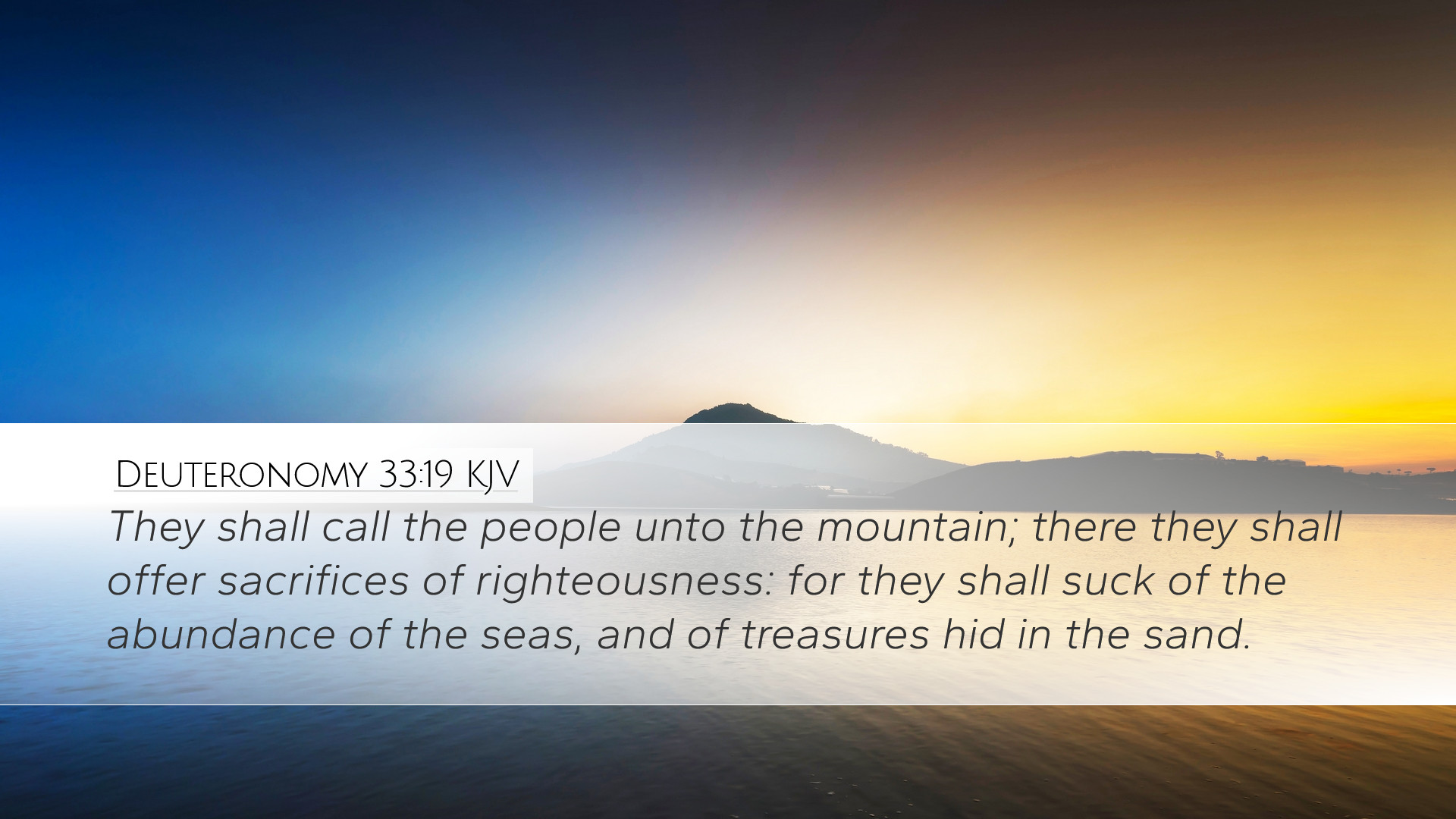Commentary on Deuteronomy 33:19
Text of Deuteronomy 33:19: "They shall call the people unto the mountain; there they shall offer sacrifices of righteousness: for they shall suck of the abundance of the seas, and of treasures hid in the sand."
Introduction
This verse is part of Moses' prophetic blessing upon the tribes of Israel as he prepares to leave them. It emphasizes the significance of the mountains and the richness of the land which the Israelites are to inherit. Understanding this verse requires an insightful examination of its historical, cultural, and theological contexts.
Historical Context
Deuteronomy is a book characterized by Moses' final addresses to the Israelites before they enter the Promised Land. This specific chapter outlines Moses' blessings over the tribes, reflecting on their roles and destinies. The invocation of the "mountain" here symbolizes stability, prominence, and the place of covenant worship.
Insights from Public Domain Commentaries
1. Matthew Henry's Commentary
Matthew Henry emphasizes the dual aspects of this verse: the proclamation of gathering ("call the people unto the mountain") and the acts of worship and sacrifice involved. He sees this as a demonstration of Israel's unity under God's guidance, where offerings symbolize their devotion and acknowledgment of God's sovereignty. Moreover, Henry discusses the metaphor of “sucking” from the abundance of the seas, representing the providence of God in supplying the needs of His people.
2. Albert Barnes' Notes on the Bible
Albert Barnes provides a more detailed elucidation of the "mountain" as a reference to Sinai, the mount of divine revelation. He asserts that the call to the mountain signifies an invitation to worship, a desire for covenantal relationship with God, and solemn assembly for the purpose of offering. Barnes also highlights that the "sacrifices of righteousness" refer to the genuine offerings that reflect the spiritual state of the people - an internal righteousness leading to acceptable worship before God.
3. Adam Clarke's Commentary
Adam Clarke offers a nuanced view of the text, interpreting the mountains as a metaphor for the high places of worship and the “abundance of the seas” as a depiction of God's blessings. Clarke suggests that “treasures hid in the sand” might symbolize both material wealth and spiritual riches, the hidden virtues and truths that God provides to those who seek Him diligently. He views this as an encouragement for the Israelites to remain faithful in their covenant relationship, as those who pursue righteousness will find great abundance.
Theological Implications
This verse encapsulates several theological themes that are crucial for understanding the nature of the covenant between God and His people:
- The Centrality of Worship: The act of calling the people to the mountain highlights the importance of communal worship and the need for collective acknowledgement of God's sovereignty.
- Provision and Abundance: The imagery of abundance from the seas and treasures hidden in the sand illustrates God's generosity and the richness of His blessings that come with faithfulness.
- Righteousness in Offering: The mention of "sacrifices of righteousness" portrays the heart condition required for worship and serves as a reminder that acceptable worship must arise from a life of integrity and obedience.
Practical Applications for Today’s Leaders
For pastors and leaders in the church, this verse serves as a profound reminder of their calling to lead the congregation towards both worship and righteousness:
- Inviting the Community: Leaders are tasked with the duty to 'call the people' together, fostering a strong communal worship experience that reflects unity and fervor in faith.
- Teaching Righteous Living: There is a need to teach and embody a lifestyle of righteousness that goes beyond mere ritual, ensuring that every sacrifice reflects a heart aligned with God’s will.
- Recognizing God’s Abundance: Pastors should consistently remind their congregations of God's abundant provision, both material and spiritual. This fosters gratitude and a spirit of abundance rather than scarcity.
Conclusion
Deuteronomy 33:19 encapsulates a powerful message about unity, righteousness, and divine provision. Through careful analysis of public domain commentaries, it becomes evident that this passage is not merely a historical record but a living word that resonates with themes of worship and the abundant life promised to those who faithfully follow God. For pastors, students, theologians, and Bible scholars, the insights derived here offer a profound basis for teaching, preaching, and understanding the richness of God’s covenant with His people.


